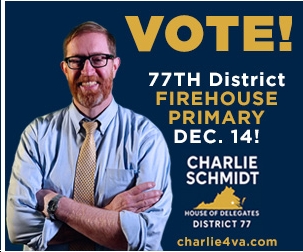by Ivy Main, cross-posted from Power for the People VA
Natural gas is having a moment. The war in Ukraine spotlighted Europe’s heavy reliance on Russian gas and the challenge of replacing it with new supplies from elsewhere. Suddenly the Biden administration, after talking so much about the need to get off fossil fuels, wants to expand oil and gas production and boost exports of liquified natural gas.
The president still intends to address the climate crisis, just not right now. The sudden shift brings to mind St. Augustine’s prayer: “Lord, make me virtuous, but not yet!”
Don’t be fooled, though. In fact, natural gas is facing an existential crisis. Back when it was cheap, it wasn’t profitable; now that prices are high, U.S. consumers have better alternatives. Europeans will want to import our expensive LNG only until they have other options. Today’s tight supplies obscure the big-picture reality that the gas industry is in the fight for its life.
The fracking industry likes to bill its product as the cleaner and cheaper alternative to coal in generating electricity. And indeed, advances in fracking technology produced a years-long glut of gas, driving prices so low that gas overtook coal as the top fuel in U.S. power generation beginning in 2015. Gas made up 38.3 percent of electricity in 2021 compared to coal’s 21.8 percent.
But competition from ever-cheaper wind and solar have stalled the gas industry’s growth in the power sector. Today utilities are more interested in building renewable energy and battery storage than new gas plants. Natural gas was projected to make up only 16 percent of new U.S. electricity generating capacity in 2021, compared to 39 percent for solar and 31 percent for wind.
High prices will exacerbate this trend. Natural gas prices today are higher than at any time since 2008, having more than trebled in just the past two years. The rise began well before the war in Ukraine, and now international market demand has pushed it higher. This is good for fracking companies that spent the last 10 years losing money, but from a utility’s perspective, price-stable renewables just look better and better.

Fortunately for the gas industry, making electricity is just one use for its product. Methane remains the dominant fuel for heating buildings, with about half of U.S. homes and businesses using it for space heating, water heating, cooking and other appliances. It is also a feedstock for many industrial operations, including fertilizer and plastics manufacturing. Protecting the first use, and expanding the second, are critical to staving off obsolescence.
That explains three pieces of legislation passed in Virginia in the past two years, all modeled on bills enacted in other states. One, which I’ll discuss in a minute, originally would have prohibited local governments from banning new gas connections within their jurisdiction, protecting the industry’s access to new retail customers. Another sets up a way for gas companies to include methane from pig waste lagoons and other non-fossil sources in their pipelines, allowing them to claim green credit — and subsidies — for marketing what they call renewable natural gas.
Finally, 2021 legislation promotes “advanced recycling” of waste plastics — using a process called chemical conversion to turn plastic into other plastic or into fuel and then burning it — in part to forestall efforts to phase out single-use plastics like Styrofoam food containers and plastic bags. As a technology, chemical conversion is inelegant, being energy-intensive and highly polluting. As a business, the economics are questionable (and the main company benefiting from the law canceled plans for a facility in Virginia). But as PR, the reframing is brilliant. Why not expand plastics production forever if we can turn the waste into fuel or new plastic?
Indeed, the success of the law can be seen in Gov. Glen Youngkin’s new executive order ostensibly promoting recycling while overturning a previous order from Ralph Northam that required executive agencies to give up single-use plastics by 2025. General Assembly members are also falling for the propaganda, proposing via the state budget to delay the ban on polystyrene food containers that was to have taken effect beginning next year.
Banning the bans: the gas industry fights building electrification
RNG and plastics are important for the gas industry, but protecting its market share in the building sector is central to its future. Ultimately it is doomed to failure. All-electric buildings are a requirement for a fully decarbonized economy, and their health and safety advantages make a compelling case for localities that want to help meet climate targets by preventing new homes from being connected to gas lines. Some cities in solidly blue states have banned new gas hook-ups; elsewhere, red state legislatures are passing laws to ban the bans.
Public support for these bans will grow as people learn more about the hazards of using gas in their homes. Read enough stories about methane leaking from underground pipes and in homes (and occasionally exploding and setting fire to buildings), or about the health impacts of indoor air pollution from gas heaters and stoves, and you may wonder why we ever thought it a good idea to have open flames in our homes. Yet once a house is built with a gas furnace and appliances, it is much harder for a homeowner to go all-electric.
To be clear, though, no Virginia jurisdiction has sought to ban gas connections, and it’s not clear whether they could do so in a Dillon Rule state like Virginia. Right now, a law to keep them from doing so sounds a little on the hysterical side, like prohibiting people from walking tigers off-leash.
Indeed, the proponents of HB1257 could cite only a much narrower threat. The City of Richmond recently committed itself to achieving net zero greenhouse gas emissions by 2050. Unlike almost any other city in Virginia, Richmond owns a gas utility that serves its residents and businesses. Sometime in the next 28 years, if the city is serious, it will have to sell the utility or shut down gas service, forcing customers to look elsewhere if they want gas.
The gas industry and its industrial customers used this far-off threat as a pretext for a Virginia ban-the-ban bill. In its original form, HB1257 (Kilgore) declared it the right of every person to access natural gas, calling this “energy justice,” and explicitly forbidding any public entity from doing anything to interfere with this sacred right. (Oh, except that gas utilities don’t have to supply gas even to willing customers if they can’t make money doing so, and they are free to cut off service to anyone who can’t pay their bills. Justice stretches only so far as profit permits.)
The Republican-led House passed the whole bill, but the Democratic-led Senate pared it back to deal just with a locality that gets out of the gas utility business, requiring that it give three years’ notice and try to sell or auction off the utility. The final version omits the “energy justice” language that was such an inspiring tribute to George Orwell, but it solves the “immediate” problem in Richmond.
But it’s not likely that we have seen the end of legislative efforts in Virginia to ban local restrictions on natural gas connections. The gas industry needs to lock in new customers now, because its future is looking very bleak indeed.
This column originally appeared in the Virginia Mercury on April 21, 2022.













![Video: Sen. Tim Kaine on “Meet the Press” Says DoJ Not Complying with the Law on Release of ALL the Epstein Files, But Argues “I think [impeachment/contempt for DoJ officials is] premature”](https://bluevirginia.us/wp-content/uploads/2025/12/kainemtp1221-100x75.jpg)

![Video: Rep. James Walkinshaw (D-VA11) Says “It’s enormously frustrating,” as “the law is clear…the full files were supposed to be released [yesterday] and the Trump administration is not in compliance with that law”](https://bluevirginia.us/wp-content/uploads/2025/12/walk1219-100x75.jpg)